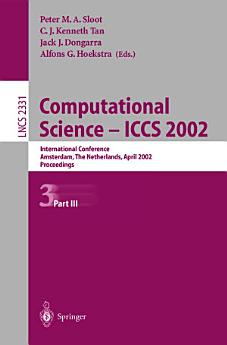Computational Science — ICCS 2002: International Conference Amsterdam, The Netherlands, April 21–24, 2002 Proceedings, Part III
Peter M.A. Sloot · C.J. Kenneth Tan · Jack J. Dongarra · Alfons G. Hoekstra
আগ ২০০৩ · Springer
ই-বুক
1230
পৃষ্ঠা
reportরেটিং ও রিভিউ যাচাই করা হয়নি আরও জানুন
এই ই-বুকের বিষয়ে
Computational Science is the scientific discipline that aims at the development and understanding of new computational methods and techniques to model and simulate complex systems. The area of application includes natural systems - such as biology environ mental and geo-sciences, physics, and chemistry - and synthetic systems such as electronics and financial and economic systems. The discipline is a bridge bet ween 'classical' computer science - logic, complexity, architecture, algorithm- mathematics, and the use of computers in the aforementioned areas. The relevance for society stems from the numerous challenges that exist in the various science and engineering disciplines, which can be tackled by advances made in this field. For instance new models and methods to study environmental issues like the quality of air, water, and soil, and weather and climate predictions through simulations, as well as the simulation-supported development of cars, airplanes, and medical and transportsystems etc. Paraphrasing R. Kenway (R.D. Kenway, Contemporary Physics. 1994): 'There is an important message to scientists, politicians, and industrialists: in the future science, the best industrial design and manufacture, the greatest medical progress, and the most accurate environmental monitoring and forecasting will be done by countries that most rapidly exploit the full potential of computational science'. Nowadays we have access to high-end computer architectures and a large range of computing environments, mainly as a consequence of the enormous sti mulus from the various international programs on advanced computing, e.g.
ই-বুকে রেটিং দিন
আপনার মতামত জানান।
পঠন তথ্য
স্মার্টফোন এবং ট্যাবলেট
Android এবং iPad/iPhone এর জন্য Google Play বই অ্যাপ ইনস্টল করুন। এটি আপনার অ্যাকাউন্টের সাথে অটোমেটিক সিঙ্ক হয় ও আপনি অনলাইন বা অফলাইন যাই থাকুন না কেন আপনাকে পড়তে দেয়।
ল্যাপটপ ও কম্পিউটার
Google Play থেকে কেনা অডিওবুক আপনি কম্পিউটারের ওয়েব ব্রাউজারে শুনতে পারেন।
eReader এবং অন্যান্য ডিভাইস
Kobo eReaders-এর মতো e-ink ডিভাইসে পড়তে, আপনাকে একটি ফাইল ডাউনলোড ও আপনার ডিভাইসে ট্রান্সফার করতে হবে। ব্যবহারকারীর উদ্দেশ্যে তৈরি সহায়তা কেন্দ্রতে দেওয়া নির্দেশাবলী অনুসরণ করে যেসব eReader-এ ফাইল পড়া যাবে সেখানে ট্রান্সফার করুন।






